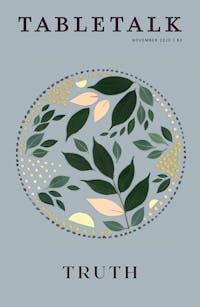
Request your free, three-month trial to Tabletalk magazine. You’ll receive the print issue monthly and gain immediate digital access to decades of archives. This trial is risk-free. No credit card required.
Try Tabletalk NowAlready receive Tabletalk magazine every month?
Verify your email address to gain unlimited access.
We will consider the theme of “knowing the truth” by commenting on the biblical account of creation, fall, and restoration in terms of the loss and regaining of knowledge, by noting how Paul writes in the early chapters of his letter to the Romans of the plight of the human race. Though fallen, the race retains the image of God (Gen. 9:6; James 3:9). The term image when used in Genesis is not simply a flattering literary device but something that carries deep significance. We image our Creator by our capacity to know God as God knows us. But unlike our immutable God, we have lapsed into unbelief.
The image of knowing and willing remains, though it is spoiled. We have understanding and acts of will, and the Bible indicates this in various ways. Two ways are prominent: our ability to form false beliefs and our ability to have evil goals. The Bible sees these as the result of self-deception and the working of the effect of the fall on our conscience. We construct idols and have bad consciences. We worship the creation in some way or another, rather than our Creator. This is the Pauline theme of sinfulness as a loss of knowledge. For Paul, loss of knowledge is a matter not of forgetting a collection of facts but of having minds that twist what we learn. We are unbalanced and warped. Mankind at first had the knowledge of God—“What can be known about God is plain . . . because God has shown it” (Rom. 1:19)—to the extent that God has revealed His divine nature, His power, and more of Himself, which amounts to a perception of His nature through subsequent generations, despite our downward spiral.
Disobeying God is our responsibility. We degenerate, we cease to think straight, we speculate, and our hearts are clouded in ignorance, and man created in the image of God creates images of his own—of animals and even of himself. By not honoring God or thanking Him, man becomes futile in his actions and darkened in his heart (Rom. 1:21). He creates images “resembling mankind and birds and animals and creeping things” (v. 23). As a result of his defiance, man exchanges God for some aspect of the creation to worship, including himself, rather than the blessed Creator (v. 25). This spiral whirls round to sexual immorality (vv. 24, 26, 28). And we are further debased in various ways that involve the loss of integrity. Whether we are Jew or gentile, our darkened minds have two standards. Though the gentiles, who do not have access to the revealed law of God, can condemn stealing, we ourselves steal. What this shows is that this knowledge is not acceptance of certain facts, but the knowledge of God includes our wills. It is the state of hearts that leads to evil acts. In this plight the gentiles have two standards, as do the Jews (2:12–29). All hearts are self-deceiving. The Jews, despite having God’s special revelation, are unfaithful (vv. 20–21). Bitingly, Paul says, “You then who teach others, do you not teach yourself? . . . You who boast in the law, do you dishonor God by breaking the law?” (vv. 21, 23).

Even the Jews are in need of God’s saving grace as much as the gentiles. The plight of unbelieving Jews lies in their deceptiveness and hypocrisy. Despite having access to God’s grace in a way the gentiles do not, the Jews as a whole have gone astray. There are various strands to that plight. For example, self-deception leads man to go down other paths rather than to follow the God-appointed route. Paul says that our creaturely, dependent, fragile nature makes us realize that we have a Creator and that the creation is not just one gigantic accident. In our conscience, we possess a sort of inner judge that monitors what we think and do. Bearing the image of God has these inevitable consequences. All mankind, Jew and gentile, is under sin, bearing its burden.
But Paul does not leave his knowledge theme at this point. He is an Apostle of Jesus Christ. The good news is that the righteousness of God has been manifested, apart from the law, although the law and prophets also bear witness to it. What do we need to learn? The way of acquiring “the righteousness of God through faith in Jesus Christ for all who believe” (3:22). A way of deliverance from our warped selves.
